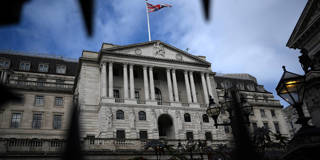The Bank of England’s recent intervention in the UK government bond market may have prevented a financial crisis, but it will also stoke inflationary pressures. Prime Minister Liz Truss must reverse her tax cuts and introduce policies to help struggling homeowners, thereby allowing the BOE to focus on restoring price stability.
NEW YORK – Following a week of financial-market turbulence, UK Prime Minister Liz Truss was forced to scrap her plan to abolish the 45% top income-tax rate for high earners. This U-turn, an attempt to counter a stunning market sell-off that caused the pound to crash and saw the Bank of England launch a massive bond-buying program to prevent “material risk to UK financial stability,” is a necessary first step toward stabilizing the economy. But unless Truss reverses more of the tax cuts or introduces policies to protect pensioners and help struggling mortgage borrowers, the market turmoil will not end soon. In fact, it could get worse.

NEW YORK – Following a week of financial-market turbulence, UK Prime Minister Liz Truss was forced to scrap her plan to abolish the 45% top income-tax rate for high earners. This U-turn, an attempt to counter a stunning market sell-off that caused the pound to crash and saw the Bank of England launch a massive bond-buying program to prevent “material risk to UK financial stability,” is a necessary first step toward stabilizing the economy. But unless Truss reverses more of the tax cuts or introduces policies to protect pensioners and help struggling mortgage borrowers, the market turmoil will not end soon. In fact, it could get worse.